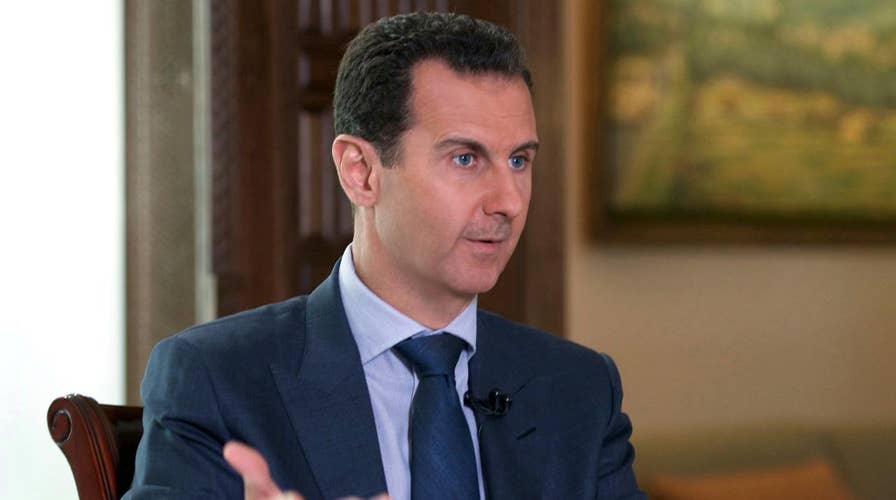Kazianis: White House smart to call out Assad regime
Director of defense studies and senior editor for The National Interest explains
All the bombs in the world won’t put Syria back together again—but one misplaced cruise missile could spark the ultimate of national security nightmares: a war between the United States and Russia that would do nothing to eliminate the suffering of the Syrian people and turn a regional conflict into a global one.
But before you decide whether it’s time to invest in a bomb shelter, let’s take a step back and consider where U.S. policy is on Syria and what Washington’s menu of options are—and why military force might not be the best of such choices.
First, it goes without saying the Trump administration made the right move in calling out the Syrian regime as it saw signs the despot of Damascus, Bashar Assad, could be getting ready again to butcher his own people with chemical weapons.
In a statement late Monday night, the administration warned that “If…Mr. Assad conducts another mass murder attack using chemical weapons, he and his military will pay a heavy price.”
That might be all it takes to freeze the Syrians from striking, knowing that the Trump administration has already attacked once, and could very well do so again.
Then again, a madman like Assad, who has shown no regard for human life and is backed by strong allies in Moscow and Tehran, might see some sort of tactical gain in using chemical weapons—weapons he promised to have given up years ago, by the way—and strike anyway.
And to be clear, the pressure will be intense for America to respond if Assad does decide to strike. The images of past chemical attacks pull at the moral fiber of anyone—watching your fellow man gasp for air, dying in potentially the worst possible way, naturally makes anyone want to seek vengeance for those lives lost. It’s only human.
Clearly Washington has all the military firepower in the region it needs to not only ensure Assad pays a heavy price – with an aircraft carrier and surface combatants in the region ready to strike at a moment’s notice – but could quickly open a wider campaign to damage the Syrian regime’s offensive military capabilities dramatically. It sounds easy, right?
There’s just one problem. The U.S. is not the only great power operating in the skies and battlefields over Syria. Russia has a sizeable amount of forces in the region. All it would take is one accidental death of a Russian soldier by a U.S. smart bomb to set off a chain of events that could escalate out of control.
Consider for a moment the amount of pressure points Washington and Moscow share now. Not only do America and Russia support different factions in the Syrian Civil War but have very different geopolitical goals on a global scale.
Russia has been angered for years at Washington’s push for expanding NATO towards its borders. While expansion of the alliance was the right call, Moscow has done all it can to push back, especially with recent aggressive interaction with U.S. forces in the air just last week above the Baltic Sea.
Then there is Ukraine—another civil war that has claimed countless lives. Russia’s goal is quite clear: to destabilize Kiev as much as possible so European Union or NATO membership is unthinkable.
And then there is the 2016 Presidential election. While there is zero evidence that President Trump colluded with Moscow in any way whatsoever, just the allegation alone creates tensions for both sides — that both can be “tough” with the other if the rubber hits the road, a situation that benefits no one.
So imagine if one American bomb wounds or kills a Russian solider — the aftermath could be quite ominous.
President Putin, already under pressure at home to respond to U.S. sanctions, could decide it is time to respond across the geopolitical chessboard in Europe, reigniting fears of a U.S.-Russia rivalry not seen since the Cold War. And considering both sides have thousands of nuclear weapons, neither side benefits from a showdown.
Washington therefore must consider other options to not only stop Assad from using chemical weapons, but to end this civil war once and for all.
One of the best ways to do that is to limit the amount of weapons that get into Assad’s hands. In a devastating report by DefenseOne, North Korea has been supplying the Assad regime with large amounts of weapons systems and, according to the report, helped develop its chemical weapons. President Trump must make it clear: if North Korea continues to arm Assad in any way, Washington will press ahead along all tracks to stop them, keeping all options on the table, to make sure Pyongyang pays for its mistake.
Washington must also make sure that all avenues of diplomacy are exhausted. The American people elected the president on a platform of U.S. foreign policy that promised to put “America First.” While we can debate the meaning of such a statement, getting involved in another conflict in the Middle East would run completely counter to such a promise. Diplomacy may be a long and painful road, but it is perhaps the only course of action that, in the long run, can end hostilities in Syria.
If, however, Washington does decide military action is the only course of action, the Trump administration must communicate with Moscow its intentions with crystal clarity and where it will strike well in advance. While that might blunt the damage America’s weapons can do against Assad, preventing a much bigger conflict is of vital importance.
However, let’s just hope for all our sakes it doesn’t happen, and President Trump decides to go down a different path—or Assad comes to his senses.









































